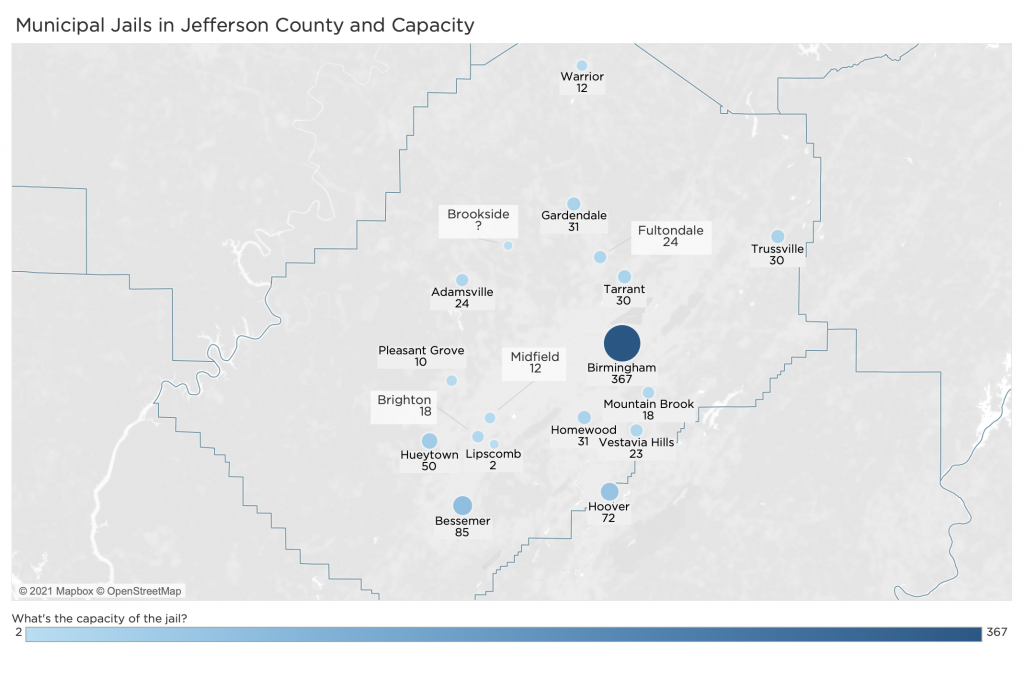Taking population into consideration, Jefferson County may have more jails than any other major county in the U.S., and the county’s mayors are investigating options for decreasing the liability, expense, and inefficiency that comes with operating so many separate facilities.

As part of ongoing regional cooperation efforts, the Jefferson County Mayors Association commissioned a new study jointly funded by the Association and the Community Foundation of Greater Birmingham. The resulting report, authored by the Public Affairs Research Association of Alabama, examines the capacity, occupancy, and age of Jefferson County’s 18 jails and identifies short-term and long-term options for decreasing the number of jails through cooperation between cities and the county.
The report finds that Jefferson County’s 18 municipal jails have a combined capacity that far exceeds the diminished number of municipal inmates typically held in them, a situation that predates the Coronavirus pandemic.
Several jail facilities including Bessemer, Birmingham, and Jefferson County’s downtown Birmingham jail, are aging and in need of serious repair or replacement.
Several factors are driving cities to reconsider operating jails. The cost of providing medical or mental health care to inmates can be high. Prisoner lawsuits and potential injuries to employees create a liability risk for cities. Municipal courts are now less likely to keep prisoners in jail, driving down occupancy and driving up per prisoner costs.
At both the national and state level, there is a trend toward shared jail facilities between cities and between cities and counties. Across the U.S., most jails are operated at the county level; 80 percent of jails are operated by county sheriffs. Most large cities in Alabama, including Huntsville, Mobile, Tuscaloosa, Auburn, Florence, and Decatur, now contract with the county sheriff for holding inmates. Several Jefferson County cities have closed their jails and contract with neighboring cities to hold prisoners. Other cities contract with Jefferson County Sheriff’s Office for both patrol and jail services.
The development of the report and discussions of the findings have launched conversations between mayors and county officials about the options, discussions that expected to continue in 2021.
As a long-term solution, Jefferson County Sheriff Mark Pettway has expressed interest in constructing and operating a metro jail capable of housing inmates from interested municipalities.
However, that proposal is years away from being considered. Jefferson County is still recovering from bankruptcy and will not be in a position to provide financial backing until 2024. Depending on the location, a new facility could necessitate the construction of both a new jail and courthouse. Such an expensive project would require a broad array of support from county commissioners, judges, law enforcement, the district attorney and the defense bar. And, for the project to provide substantial savings for the community at large, municipal participation, particularly from the city of Birmingham would be crucial.
In the shorter-term, cities can collaborate through contract. Police officials in Birmingham say they are willing to house prisoners from other jurisdictions, using the revenue to renovate operate the Birmingham jail. Police officials in Hueytown and Adamsville also have excess capacity and are have expressed willingness to provide jail space to neighboring jurisdictions. Trussville and Warrior already are hosting inmates from neighboring cities.
In the long-term, political leaders in Birmingham and other cities are interested in getting out of the jail business. But in order to do that, an agreement would need to be struck either with the sheriff and Jefferson County or with a coalition of cities coming together to form a regional authority to construct and operate a shared jail.
